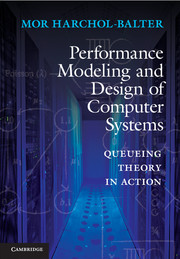Book contents
- Frontmatter
- Contents
- Preface
- Acknowledgments
- I Introduction to Queueing
- II Necessary Probability Background
- III The Predictive Power of Simple Operational Laws: “What-If” Questions and Answers
- IV From Markov Chains to Simple Queues
- V Server Farms and Networks: Multi-server, Multi-queue Systems
- VI Real-World Workloads: High Variability and Heavy Tails
- VII Smart Scheduling in the M/G/1
- Bibliography
- Index
VI - Real-World Workloads: High Variability and Heavy Tails
Published online by Cambridge University Press: 05 February 2013
- Frontmatter
- Contents
- Preface
- Acknowledgments
- I Introduction to Queueing
- II Necessary Probability Background
- III The Predictive Power of Simple Operational Laws: “What-If” Questions and Answers
- IV From Markov Chains to Simple Queues
- V Server Farms and Networks: Multi-server, Multi-queue Systems
- VI Real-World Workloads: High Variability and Heavy Tails
- VII Smart Scheduling in the M/G/1
- Bibliography
- Index
Summary
Part VI discusses queueing analysis where the arrival process and/or service process are generally distributed.
We start with Chapter 20, where we study empirical job size distributions from computing workloads. These are often characterized by heavy tails, very high variance, and decreasing failure rate. Importantly, these are very different from the Markovian (Exponential) distributions that have enabled the Markov-chain-based analysis that we have done so far.
New distributions require new analysis techniques. The first of these, the method of phase-type distributions, is introduced in Chapter 21. Phase-type distributions allow us to represent general distributions as mixtures of Exponential distributions. This in turn enables the modeling of systems involving general distributions using Markov chains. However, the resulting Markov chains are very different from what we have seen before and often have no simple solution. We introduce matrix-analytic techniques for solving these chains numerically. Matrix-analytic techniques are very powerful. They are efficient and highly accurate. Unfortunately, they are still numerical techniques, meaning that they can only solve “instances” of the problem, rather than solving the problem symbolically in terms of the input variables.
In Chapter 22 we consider a new setting: networks of Processor-Sharing (PS) servers with generally distributed job sizes. These represent networks of computers, where each computer time-shares among several jobs. We again exploit the idea of phasetype distributions to analyze these networks, proving the BCMP product form theorem for networks with PS servers. The BCMP theorem provides a simple closed-form solution for a very broad class of networks of PS servers.
- Type
- Chapter
- Information
- Performance Modeling and Design of Computer SystemsQueueing Theory in Action, pp. 347 - 348Publisher: Cambridge University PressPrint publication year: 2013
- 1
- Cited by



